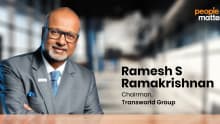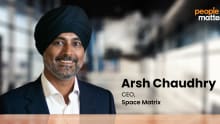Meeting evolving needs, driving inclusive growth: A conversation with HP Singapore MD Fiona Lee

The tech industry is not just about machines and codes; it's about people. Fiona Lee, the Managing Director for HP Singapore, acknowledges the pronounced challenges in meeting the expectations of employees, particularly the younger generation. When purpose guides career choices, leaders grapple with the need to offer a sense of purpose beyond traditional business management.
The recent breakthroughs in AI are reshaping the tech industry. Fiona sees vast opportunities it presents—enhanced productivity through streamlined tasks like data analysis. The shift towards decentralised AI processing is bringing power to endpoint devices like PCs enabling real-time decision-making, says Fiona. Beyond productivity, this addresses cybersecurity concerns.
Leading a 3,000-strong workforce, Fiona delves into the Palo Alto-based tech company's business and people needs, encompassing its hybrid work strategy and the significance of diversity and sustainability within the Singapore tech sector. She shares profound insights on the company's evolution—from the imperative of technological innovation to its adaptability in addressing evolving needs.
Here are the edited excerpts:
What are your top challenges today as the MD of HP Singapore?
The accelerated pace of change, particularly since the pandemic, poses a key challenge for leaders - balancing business stability with the agility to swiftly adapt. As hybrid work persists, managing shifting dynamics around employee productivity, work-life integration and well-being grows complex.
On the people front, the challenges are even more pronounced. The expectations and needs of employees, especially the younger generation, are evolving. They seek a different sense of purpose when choosing a company to join. So, as a leader and CEO, these aspects pose significant challenges that go beyond the traditional realms of business management.
Also Read...
- An exclusive interview Citi's Global DEI chief Erika Irish Brown
- A conversation with Cisco India’s Daisy Chittilapilly
What trends and shifts are currently shaping the technology industry, especially in Singapore?
There are significant transformations underway, and a key player in this evolution is the rise of Artificial Intelligence (AI). While AI itself isn't new, the emergence of generative AI marks a pivotal change, akin to the transformative impact the Internet had. This is exemplified by the swift adoption of AI skills, with Singapore leading in the diffusion rate among LinkedIn members—a staggering 20 times growth in members adding AI skills to their profiles from January 2016.
The potential of AI is vast, promising enhanced productivity by streamlining tasks like data analysis and providing valuable recommendations. One shift in particular is the move towards decentralised AI processing, bringing the power of AI technology to endpoint devices like PCs.
Cybersecurity breaches are on the rise globally. HP recognises the importance of securing endpoint devices, especially with the shift to hybrid work, where employees operate from various locations. The focus is on comprehensive protection, covering physical, BIOS-level, and beyond, to guard against evolving cyber threats.
The pressing climate crisis has influenced consumer preferences, with a substantial portion in Singapore expressing a preference for sustainably sourced products. This shift extends beyond consumers to the workforce, where both parents and the younger generation prefer companies committed to environmental and social issues.
These trends also present opportunities for businesses to align with evolving expectations and make a positive impact on both environment and society.
Could you elaborate more on your strategies regarding incorporating AI into your devices and solutions?
Our approach to generative AI aligns with the evolving landscape of work, especially with the permanence of hybrid work. We've implemented AI in various solutions, including laptops and Poly solutions, following our recent acquisition of Poly. Looking ahead, our vision for generative AI extends beyond mere cloud-based applications. We are working towards embedding AI directly into every PC, facilitating real-time data analysis, recommendations, and dialogue without the lag associated with cloud-based processing. Our overall approach to generative AI involves integrating it into our devices and solutions, prioritising real-time applications to enhance user experiences and productivity.
What sets HP apart in the intense competition among tech companies in the computing space?
The integrated hybrid work solutions is a distinctive feature for HP. The merger with Poly, integrating collaboration tools, has positioned us as a force in the computing space. Our printing technology extends from consumer to office and industrial printing. An example of our innovation extends to inkjet technology, initially developed for printing, now being leveraged in vaccination and cancer research. The microfluidics technology, used for the accurate placement of drops on paper, is now contributing to advancements in healthcare, particularly in testing where it replaces manual pipetting. Our 3D technologies allow us to print organs such as the heart for surgical practice, enhancing outcomes and reducing costs for patients.
You mentioned your structured hybrid work plans. What does it look like?
Most individuals in Singapore are back for 3 to 4 days a week, with efforts to enhance the workplace environment. As a global company, HP has provided broad guidelines suggesting a return to the office for 2 to 3 days a week, allowing individual teams to decide their preferred balance. Some teams may prioritise in-person collaboration for building culture and camaraderie, designating specific days for everyone to be in the office. In HP Singapore, in particular, nearly 50% of employees returned to the office, surpassing the global average of around 30%.
In the wake of recent disruptions, the tech industry's approach to Diversity, Equity, and Inclusion (DEI) has changed. Some removed diversity roles, while others ramped up DEI efforts. How do you see the broader tech industry landscape on DEI progress?
In Singapore, where I engage extensively with various companies, DEI is a strong focus for many tech firms. Beyond the historic male-dominated perception, there's a growing commitment to address diversity across age groups.
Tech workspaces are adapting, moving from closed rooms to open, collaborative environments. This change aligns with a diverse workforce spanning four generations—Gen Z to Baby Boomers. The inclusivity push extends beyond age and gender to support LGBTQ communities and individuals with disabilities.
In my interactions, I've seen tech companies actively fostering inclusive workplaces, emphasising not only gender equality but also a broader range of diversity dimensions.
What according to you are the unique DEI challenges facing the larger technology industry today?
The importance of DEI requires intentional efforts, specific programmes, and well-defined goals. Clear objectives are crucial for assessing progress in DEI initiatives. Larger companies have resources but need everyone on board for the DEI journey. Smaller companies lack resources for robust DEI programmes and progress monitoring. Hence, bridging the gap between larger corporations and smaller businesses is essential. Established companies can support SMEs and SMBs in developing effective DEI strategies.
The core challenges revolve around translating DEI rhetoric into actionable steps, monitoring progress, and finding ways to involve companies of all sizes in the journey.
How is HP integrating DEI principles into its overall business strategy and decision-making processes, and what targets are in place?
HP globally aims to achieve 50/50 gender equality across leadership positions, specifically for Director-level roles and above, by 2030. And we are committed to having more than 30% of women in technical and engineering roles. We have about 40% women in leadership positions in HP Singapore, surpassing the industry average of 20-30%. We are working towards reaching the 30% target for women in engineering roles.
What are the metrics that you follow to measure the progress on DEI initiatives?
HP employs a comprehensive approach to measure its progress in Diversity, Equity, and Inclusion (DEI) initiatives, encompassing programme impact measurement, an annual "Voice Insights In Action" survey, leadership representation metrics targeting 50/50 gender equality globally, tracking women in technical and engineering roles with a goal of over 30% by 2030, and external recognition, including accolades.
As a woman CEO, what's your advice for women aspiring for leadership roles in the tech industry? What advice would you give to recruitment specialists striving to promote diversity and equity within their organisations?
- Say Yes and Get Out of Your Comfort Zone: Don't hesitate to take on new challenges. Say yes to opportunities that come your way, even if they seem outside your comfort zone. Embrace the chance to learn and grow.
- Find Sponsors, Not Just Mentors: Seek sponsors within and outside the company. Sponsors are individuals who understand your character, resilience, and personal qualities. They can advocate for you and support your career advancement.
- Be Confident and Persistent: Build confidence in your abilities and be persistent in pursuing your goals. You don't have to be perfect, but you should be persistent and resilient in the face of challenges.
- Build Internal Networks: Cultivate relationships within the organisation. Build a network of colleagues with whom you can share challenges and experiences.
- Never Stop Learning: Continuous learning is essential. Stay curious and open to new ideas. Embrace a mindset of lifelong learning, and seek opportunities to expand your knowledge and skills.
Advice for recruitment specialists ensuring DEI:
- Set Clear Diversity Goals: Establish specific diversity goals for each hiring process. For instance, aim for at least 50% women candidates and consider inclusivity factors like candidates with special needs when relevant.
- Structured and Fair Interview Process: Ensure that each candidate is asked similar questions and that the scoring is objective. Use diverse panels for interviews, including women leaders and individuals from different functions.
- Internal Promotion and Consideration: Prioritise internal candidates when possible. Encourage the consideration of internal talent, ensuring that opportunities are extended to a diverse pool of candidates.
- Diverse Interview Panels: Assemble diverse interview panels with individuals from various roles, functions, and backgrounds. A diverse panel helps ensure a fair and unbiased evaluation of candidates.
Be intentional, set clear goals, and implement fair practices.
As we near the end of 2023, what are your top two priorities for 2024?
My focus is twofold: driving tech innovation and refining people policies. First, internally, we're fostering talent development through initiatives like career fairs and cross-functional learning. Second, we're prioritizing employee well-being and volunteerism, with a goal to increase volunteer engagement to 50%. This includes introducing flexible volunteering opportunities and collaborating with the government for targeted community impact.
More for You...
- An exclusive interview with global CHRO Dr Thomas Ogilvie
- Musk's 'X'ploration of Twitter: A twisty tale
What's HP Singapore's vision for the next five years amid the rapid advancements in technology, especially those propelled by AI?
In the next five years, HP Singapore aims to deepen AI integration in R&D and manufacturing, drive sustainability through AI initiatives, offer geo-targeted AI assistance, and focus on change management. This vision aligns with becoming a leader in tech innovation and responsible business practices. Sustainability-wise, HP Singapore commits to global goals, with a specific focus on achieving zero carbon emissions locally by 2040 and adapting goals based on real-time environmental impacts and the evolving global and local sustainability landscape.
Delve into exclusive CEO and MD interviews in our LeadingEdge series! Gain fresh insights from top leaders in India, Singapore, and beyond.






